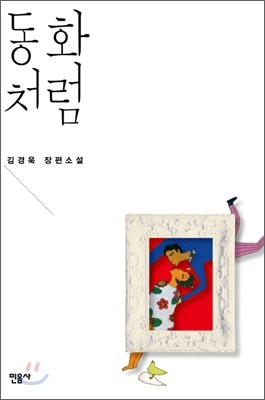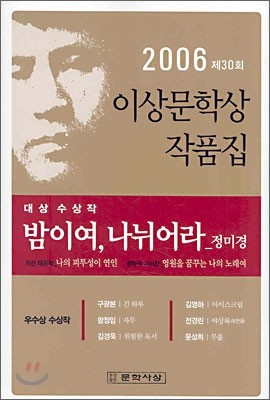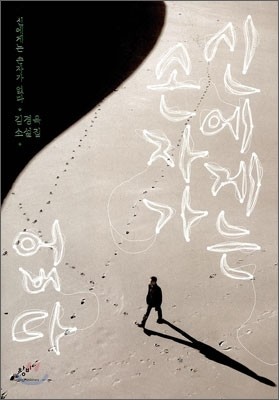Kim Kyung-uk (born 1971) is a Korean author.
Life
Kim Kyung-uk was born in Gwangju. He completed his undergraduate degree in English literature and master's degree in Korean literature at Seoul National University. His career as a novelist began when he won the 1993 Best New Writer Award from the quarterly Writer's World for his novella Autsaideo (아웃사이더 Outsider.) In 2013, he participated in the International Writing Program (IWP) at the University of Iowa.
Kim has published some 16 works of fiction, including the short story collections Wiheomhan dokseo (위험한 독서 Risky Reading), Sinegeneun sonjaga eopda (신에게는 손자가 없다 God Has No Grandchildren), Nugunga nae daehae malhal ttae (누군가 나에 대해 말할 때 When Someone Talks About Me), the novels Donghwacheoreom (동화처럼 Like a Fairytale), Yaguran mueosinga (야구란 무엇인가 What Is Baseball), Gaewa neukdaeui sigan (개와 늑대의 시간 The Hour Between Dog and Wolf), and Naraga dangsin geosini (나라가 당신 것이니 Does This Country Belong to You?). He is the recipient of the Hyundae Literary Award and the Dong-in Literary Award, among others. Kim teaches creative writing at the Korea National University of Arts School of Drama.
Writing
Kim's debut novella, Autsaideo, published in 1993 while still in university, follows a first-person narrator passing several stops on the Seoul subway while recalling memories concerning a high school student he had once taught. While depicting the expressions of anonymous crowds in the urban subterranean world, the narrator continuously mulls over movie scenes and bars of pop music. His first novel, Akeuropolliseu (아크로폴리스 Acropolis), depicts university campus life in the early 1990s when interest in ideology abruptly waned.
Kim Kyung-uk not only had a great interest in music but, responding to the visual era, has published many works that explore his interest in movies and his cinematic imagination. His first short story collection, Bageudadeu kapeeneun keopiga eopda (바그다드 카페에는 커피가 없다 There’s No Coffee at the Bagdad Cafe) takes its title from the Percy Adlon film, Bagdad Café. His second novel, Moriseun hotel (모리슨 호텔 Morrison Hotel) takes its title from the Doors album released in 1970, while the short story collections Nuga keoteu kobeineul jugyeonneunga (누가 커트 코베인을 죽였는가 Who Killed Kurt Cobain) and Janggugyeongi jugeotdago? (장국영이 죽었다고? Is Leslie Cheung Really Dead?) need no explanation. The cultural icons and tastes of the 1990s function as certificates of authentication in Kim Kyung-uk’s stories, depicting the self-discovery and maturity of the author’s generation that occurred along with popular culture. In other words, Kurt Cobain and Leslie Cheung are culture itself as well as mediums that expressed in the form of culture a sense of loss and loneliness deep within the generation. [1]
More recently, the world of Kim's fiction has been moving away from the sphere of popular culture. His third novel, Hwanggeumsagwa (황금사과 The Golden Apple), is inspired by Umberto Eco’s The Name of the Rose, while Cheonnyeonui wangguk (천년의 왕국 Kingdom of a Thousand Years) is about the Dutch sailor Weltevree who was shipwrecked on the shores of Joseon in 1627. Gaewa neukdaeui sigan is based on the April 1982 mass murder incident of police officer Woo Bum-kon, depicting the tragedy strictly through the eyes of the victims. Naraga dangsin geosini, his latest novel, features an elderly spy who is called back to service in a more light-hearted return to form.
References
[1] Korea Literature Now. Vol.12, Summer 2011. https://kln.or.kr/lines/essaysView.do?bbsIdx=1562
Su obra de debut Outsider, que se publicó en 1993 cuando aún era estudiante de universidad, trata de un narrador en primera persona que se pasa varias estaciones del metro de Seúl trayendo a la memoria a un estudiante de bachillerato al que enseñó. Mientras describe las expresiones de las multitudes anónimas del mundo urbano subterráneo, el narrador no para de rumiar sobre escenas de películas y bares de música pop. Su primera novela Acropólis, describe la vida en el campus universitario a principio de los noventa, cuando desapareció el interés por las ideologías. La generación de los noventa y la cultura dominante de esta década han sido temas recurrentes en su obra.5
No solo tiene un gran interés por la música, sino que respondiendo a la era visual, publicó muchas obras que exploran su interés en el cine y la imaginación cinematográfica. De hecho, su primera recopilación de relatos cortos No hay café en el Café Bagdad toma el título de la película de Percy Adlon Bagdad Café. El relato que lleva este título es sobre un director de cine que conoce a una mujer mientras busca posibles lugares para grabar. La novela Morrisson Hotel toma su título del álbum de los setenta del grupo de rock The Doors, y las recopilaciones de relatos cortos ¿Quién mató a Kurt Cobain? y ¿Leslie Cheung está muerto? toman el nombre de un cantante y de un actor de cine, respectivamente.6
Más recientemente, el mundo de su ficción se ha alejado de la esfera de cultura contemporánea. Ha publicado La manzana dorada, una novela basada en El nombre de la rosa de Umberco Eco y El reino de los mil años sobre el holandés Weltevree, que encalló en las costas de Joseon en 1627.7
Sa première nouvelle, Outsider (A-utsa-i-deo), publiée alors qu'il était encore étudiant, est un récit à la première personne qui met en scène un personnage franchissant plusieurs stations de métro à Séoul en se remémorant une jeune lycéenne qu'il a eue pour élève. Dans sa description des foules anonymes du métro, le narrateur fait régulièrement référence à des scènes de films et à des bars à musique. Son premier roman, Acropolis (Akeuropoliseu), dépeint la vie d'un campus universitaire au début des années 1990 quand la démocratie s'est installée en Corée du Sud2.
Au-delà de son intérêt pour la musique, il développe aussi un intérêt particulier pour la création vidéo et le cinéma. Ainsi, son recueil de nouvelles intitulée Il n'y a pas de café au Bagdad Café (Bageudageu kape-eneun keopiga eopda) tire son titre du film Bagdad Café de Percy Adlon. La nouvelle phare de ce recueil traite d'un assistant réalisateur qui, en cherchant des lieux pour un tournage, va rencontrer une femme et s'éprendre d'elle. Sa nouvelle Morrison Hotel (Moriseun Hotel) emprunte son titre à l'album du même nom du groupe rock The Doors sorti dans les années 1970. Ses recueils Qui a tué Kurt Cobain ? (Nuga keoteu kobe-ineul jugyeonneunga ?) et Leslie Cheung est-il mort ? (Jang gugyeong-i jugeotdago?) proviennent à la fois du nom du leader du groupe Nirvana qui a largement symbolisé le début des années 1990, et de l'acteur basé à Hong-Kong, Leslie Cheung. Il s'agit de vedettes du monde de la culture ayant tous commis un suicide2.
Plus récemment, ses thématiques se sont tournées davantage vers une sphère plus actuelle de la culture. Il a publié La pomme d'or (Hwanggeum sagwa), une nouvelle inspirée du roman Le nom de la rose d'Umberto Eco2.
Gegen Ende des Kalten Krieges in den frühen Neunziger Jahren verweigerte die sogenannte Neue Generation - jene Generation, die in den Siebziger Jahren geboren wurde - das vorherrschende konservative Establishment und das intellektuelle Klima. Es war eine Generation, der organisierter Widerstand unbekannt war und die dafür bekannt wurde, sich in einer improvisierten Manier auszudrücken. Sie wuchs in einer Kultur des Konsums heran. Zu dieser Zeit debütierte ein Schriftsteller in seinen frühen Zwanzigern. Sein Name ist Kim Kyung-uk.
Seine erste Kurzgeschichte Außenseiter (아웃사이더), die er als Student 1993 veröffentlichte, folgt einem Ich-Erzähler, der an mehreren Haltestellen der U-Bahn in Seoul vorbeifährt und sich dabei Erinnerungen an einen Studenten, den er früher unterrichtete, ins Gedächtnis ruft. Während der Erzähler die Äußerungen anonymer Massen in der urbanen Untergrundwelt darstellt, denkt er ständig über Filmszenen und Ausschnitte aus Popmusik nach. Kims erster Roman Acropolis (아크로폴리스) schildert das Leben auf dem Universitätscampus in den frühen Neunziger Jahren, als das Interesse der Studenten an weltanschaulichen Fragen plötzlich schwand. In seinen Werken verfolgt thematisiert Kim die sogenannte 1990er Generation und die Kultur, die diese Zeit beherrschte.
Kim hat nicht nur großes Interesse an Musik, er veröffentlichte ebenfalls, passend zu dieser visuellen Ära, viele Werke, die sein Interesse an Filmen und seine filmische Fantasie ausdrücken. Tatsächlich stammt der Titel seines ersten Kurzgeschichten-Sammelbandes Es gibt keinen Kaffee im Bagdad Café (바그다드 카페에는 커피가 없다) von der Serie Bagdad Café von Percy Adlon ab. Die Titelgeschichte aus dem Sammelband handelt von einem stellvertretenden Filmdirektor, der auf seiner Suche nach passenden Drehorten einer Frau begegnet. Der Titel seines Romans Morrison Hotel (모리슨 호텔) spielt auf das Album der Rockband The Doors an und seine Kurzgeschichten-Sammlungen Wer nur hat Kurt Cobain getötet? (누가 커트 코베인을 죽였는가) und Leslie Cheung ist tot? (장국영이 죽었다고) haben ihre Titel von Kurt Cobain, dem Frontman der Band Nirvana, der die Neunziger Jahre symbolisiert und von dem Hongkong Filmstar Leslie Cheung. Bemerkenswert ist hierbei, dass sowohl Jim Morrison, der Sänger der Band The Doors, Curt Cobain wie auch Leslie Cheung Selbstmord begingen.
In seinen neueren Werken bewegt sich die Fiktion von Kim weg von der Sphäre zeitgenössischer Kultur. Er veröffentlichte den Roman Der goldene Apfel (황금사과), der auf Umberto Ecos Roman Der Name der Rose basiert, und den Roman Tausendjähriges Reich (천년의 왕국), der von dem Niederländer Weltevree handelt, der 1627 an der Küste von Chosŏn strandete.[3]
1971年生于光州。1993年,中篇小说《局外人》获得《作家世界》新人奖步入文坛。著有小说集《危险的读书》、《张国荣死了?》、《谁杀了科特·柯本》、《去见贝蒂》、《巴格达咖啡馆里没有咖啡》,长篇小说《千年的王国》、《黄金苹果》、《莫里森酒店》和《雅典卫城》等。
Ким Кёнук родился в 1971 году в городе Кванджу. Учился в Сеульском государственном университете на факультете английской филологии. В этом же университете учился в аспирантуре на факультете корейской филологии. Во время университетской учебы в 1993 году дебютировал в литературных кругах. После прекращения холодной войны и горячей идеологической борьбы, после окончания студенческих движений Ким Кёнук начал переносить события этих времен на страницы своих книг. В это же время в Корее стала стремительно развиваться поп-культура: кинематограф, поп-музыка и прочее, что также было отражено писателем в его произведениях. В 2000 году его назвали «Эволюционирующая машина повестей», после чего он продолжил искать новые актуальные сюжеты и публиковать свои книги. В настоящее время Ким Кёнук является профессором Корейского национального университета искусств, преподает театральное искусство.
Из-под его пера вышли сборники рассказов «В багдадских кафе нет кофе», «Я иду на встречу с Бетти», «Кто убил Курта Кобейна?», «Неужели умер Чанг Гукёнг?», «Опасное чтиво», «У бога нет внука», романы «Акрополь», «Отель «Морис», «Золотое яблоко», «Как в сказке» и др. В названия произведений он включает известные всем имена, а в повестях 90-х годов отражает важнейшие события корейского общества. Сейчас же диапазон его литературных интересов значительно расширился. Так, например, роман «Золотое яблоко» стал прекрасной пародией на роман Умберто Эко «Имя розы».
一九七一年光州生まれ。ソウル大学英文科を卒業、同大学校の国文科博士課程修了。大学在学中の一九九三年に作家デビューし、冷戦後、イデオロギーと学生運動への熱気が急速に冷めた当時の大学文化を小説に表現しはじめる。また、当時急激に広がっていた映画や音楽などの大衆文化も、少なからず彼の小説に影響を与えている。「進化する小説マシン」と評価されているように、金勁旭は二〇〇〇年代以降も、時代ごとの新しい素材やテーマを見つけ、彼ならではの小説を発表しつづけている。現在、韓国芸術総合学校演劇院で教授を務めている。
短編集に『バクダッド・カフェにはコーヒーがない』、『ベティに会いに行く』、『誰がカート・コバーンを殺したのか』、『レスリー・チャンが死んだって?』、『危険な読書』、『神には孫がいない』、『アクロポリス』、『モリソン・ホテル』、『黄金色のりんご』『童話のように』などがある。「バクダッド・カフェ」「モリソン」「ベティ」「カート・コバーン」「レスリー・チャン」などの名前が入ったタイトルからも分かるように、一九九〇年代に発表された彼の小説には、当時の韓国社会に押し寄せてきた大衆文化が色深く反映されており、二〇〇〇年代以降は小説の幅が広がっていることが分かる。一方、『黄金のりんご』は、ウンベルト・エーコの『薔薇の名前』の風刺小説である。
김경욱(1971~)은 대한민국의 소설가다.
생애
김경욱은 1971년 광주에서 태어났다. 서울대학교 영문과를 졸업하고 같은 대학교 국문과 박사 과정을 수료하였다. 1993년 《작가세계》 신인상에 중편소설 〈아웃사이더〉가 당선되며 작품 활동을 시작했다. 한국예술종합학교 협동과정 서사창작과에서 교수로 일하고 있다.
작품 세계
김경욱은 삶과 죽음, 죽음과 심연의 경계를 가로지르는 허무한 시선 그리고 당대를 살아가는 인간의 내면과 현실을 통해 소모되는 사람들의 모습과 사회의 성격을 적극적으로 탐구하고 감각적으로 소설화하고 있다. 또한 작가는 역사적인 사건이나 인물을 작품의 주제로 삼아 현재에 대해서 질문을 던지고 있다. 장편소설 《황금 사과》(2002)는 움베르토 에코의 소설 《장미의 이름》을 패러디한 작품으로, 역사추리 소설의 형태로 《아라비안 나이트》처럼 끝없이 이어지는 이야기를 들려주고 있다. 작가는 《장미의 이름》의 주인공 윌리엄 수도사의 이야기로 시작하여 주교의 죽음과 장례, 속권과 교권 다툼, 그리고 진실과 허구, 진리와 이단, 원복과 본사본 등에 대한 질문을 던지며 현실을 환기시킨다.
장편소설 《천년의 왕국》(2007)은 작가가 역사 속 실존했던 인물을 소재로 쓴 작품이다. 17세기 조선에서, 벨테브레 혹은 박연(朴燕)이라는 이름으로 살았던 한 네덜란드인을 주인공으로 한 이야기다. 작가는 17세기 조선에 표착(漂着)했다가 일본을 거쳐 다시 네덜란드로 돌아간 하멜이 남긴 <하멜 표류기>에 기록된 역사를 토대로 쓴 작품으로 이방인의 시선에서 타인과 세계, 죽음과 삶의 경계에 대한 탐구를 시도하고 있다.
장편소설 《야구란 무엇인가》(2013)는 복수를 다룬 서사다. 1980년 광주민주화운동을 배경으로 한 작품으로 당시 억울하게 목숨을 잃은 동생에 대한 애도를 소설화했다. 장편소설 《나라가 당신 것이니》(2021)는 작가는 지나간 시대의 맹목과 현재의 누추함으로 인해 엉망이 된 주인공을 통해 현실의 문제를 되돌아 볼 것을 제안하고 있다.
주요 작품
1) 소설집
《바그다드 카페에는 커피가 없다》, 고려원, 1996.
《베티를 만나러 가다》, 문학동네, 1999.
《누가 커트 코베인을 죽였는가》, 문학과지성사, 2003.
《장국영이 죽었다고?》, 문학과지성사, 2005.
《위험한 독서》, 문학동네, 2008.
《신에게는 손자가 없다》, 창비, 2011.
《소년은 늙지 않는다》, 문학과지성사, 2014.
《내 여자친구의 아버지들》, 문학동네, 2019.
《누군가 나에 대해 말할 때》, 문학과지성사, 2022.
2) 장편소설
《아크로폴리스》, 세계사, 1995.
《모리슨 호텔》, 열림원, 1997.
《황금 사과》, 문학동네, 2002.
《천년의 왕국》, 문학과지성사, 2007.
《동화처럼》, 민음사, 2010(개정판, 2021).
《야구란 무엇인가》, 문학동네, 2013.
《개와 늑대의 시간》, 문학과지성사, 2016.
《거울 보는 남자》, 현대문학, 2018.
《나라가 당신 것이니》, 문학동네, 2021.
수상 내역
2004년 한국일보문학상
2008년 제53회 현대문학상
2009년 제40회 동인문학상
2015년 제3회 김승옥문학상
2016년 제40회 이상문학상





